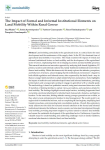Makris I., Apostolopoulos S., Giannopoulos V., Dimitrakopoulos P., Charalampakis P. (2025). The impact of formal and informal institutional elements on land mobility within rural Greece. Sustainability, 02/05/2025, vol. 17, n. 10, p. 4412.
https://doi.org/10.3390/su17104412
https://doi.org/10.3390/su17104412
| Titre : | The impact of formal and informal institutional elements on land mobility within rural Greece (2025) |
| Auteurs : | I. Makris ; S. Apostolopoulos ; V. Giannopoulos ; P. Dimitrakopoulos ; P. Charalampakis |
| Type de document : | Article |
| Dans : | Sustainability (vol. 17, n. 10, May 2025) |
| Article en page(s) : | p. 4412 |
| Langues : | Anglais |
| Langues du résumé : | Anglais |
| Catégories : |
Catégories principales 04 - DEVELOPPEMENT LOCAL ET REGIONAL ; 4.2 - FoncierThésaurus IAMM PROPRIETE FONCIERE ; ACQUISITION FONCIERE ; TRANSMISSION D'EXPLOITATION ; DEVELOPPEMENT RURAL ; GRECE |
| Résumé : | Land mobility, particularly in the agricultural sector, is a critical factor for rural development and the maintenance of the supply chain. In the EU, the dominant form of agricultural land mobility is succession. This study examines the impact of formal and informal institutional factors on land mobility and the development of the agricultural sector in Greece, emphasizing their role in shaping succession and land mobility processes. This research introduces an innovative approach by analyzing both formal (legislation, EU policies, taxation) and informal (cultural ties, family traditions) institutional factors that influence land mobility. Within this framework, this study explores the attitudes, perceptions, and behaviors of farmers, acknowledging that the institutional environment-shaped by both official regulations and informal norms, often expressed by the family head-may influence younger family members to adopt similar behaviors and practices. It also highlights the impact of ineffective and underdeveloped formal and informal institutions, providing policymakers and young people seeking to engage in agriculture with a valuable guide. The methodology is based on qualitative research, using semi-structured interviews with 21 members of farming families to capture views, perceptions, and experiences related to land mobility. The findings highlight several major barriers, including fragmented land ownership, emotional attachment to inherited land, bureaucratic obstacles, and high tax burdens. At the same time, shifting attitudes among younger generations are evident, as they adopt a more entrepreneurial mindset in land management. The results point to an urgent need for institutional reforms, such as completing the land registry, simplifying land transfer procedures, and promoting land consolidation policies. Overall, this exploratory study underscores the need for increased research attention to the formal and informal institutional elements that influence rural economic and structural development through land mobility, providing important insights for policies aimed to enhance land mobility and ensure the sustainable development of the agricultural sector. Furthermore, it provides valuable input for understanding and addressing challenges such as family traditions, emotional attachments to inherited land, and land mobility. |
| Cote : | En ligne |
| URL / DOI : | https://doi.org/10.3390/su17104412 |







